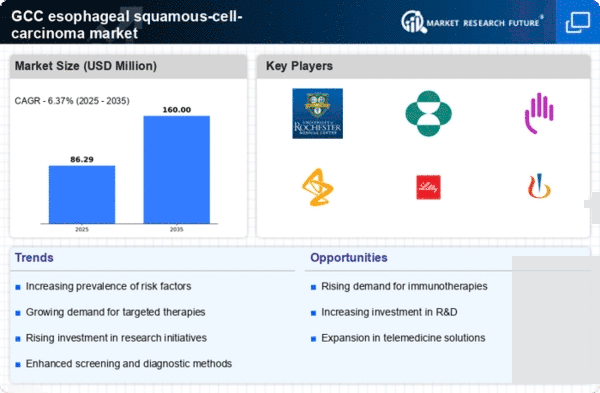Rising Healthcare Expenditure
Rising healthcare expenditure in the GCC is another significant driver impacting the esophageal squamous-cell-carcinoma market. As countries in the region continue to invest in healthcare infrastructure, the availability of advanced treatment options is expanding. Current data indicates that healthcare spending in the GCC is projected to reach $100 billion by 2026, with a substantial portion allocated to oncology services. This increase in funding allows for better access to innovative therapies and improved patient management strategies. Consequently, the esophageal squamous-cell-carcinoma market is likely to benefit from enhanced treatment modalities and increased patient access to care, fostering growth in this sector.
Advancements in Diagnostic Techniques
Recent advancements in diagnostic techniques are significantly influencing the esophageal squamous-cell-carcinoma market. Innovations such as endoscopic ultrasound and advanced imaging technologies have improved the accuracy of early detection. In the GCC, the adoption of these technologies has increased, with a reported 25% rise in early-stage diagnoses over the past few years. Enhanced diagnostic capabilities not only facilitate timely treatment but also contribute to better patient outcomes. As healthcare systems in the region invest in state-of-the-art diagnostic tools, the demand for related services and products is likely to grow. This trend indicates a shift towards more proactive healthcare approaches, which could lead to an expansion of the esophageal squamous-cell-carcinoma market as more patients seek early intervention.
Growing Investment in Cancer Research
The growing investment in cancer research is a critical driver for the esophageal squamous-cell-carcinoma market. Governments and private entities in the GCC are increasingly allocating funds towards research initiatives aimed at understanding and treating various cancers, including esophageal squamous-cell-carcinoma. Reports suggest that research funding in the region has increased by over 40% in recent years, reflecting a commitment to advancing cancer care. This influx of capital supports the development of novel therapies and clinical trials, which are essential for improving treatment options. As research progresses, it is anticipated that new therapies will emerge, potentially transforming the landscape of the esophageal squamous-cell-carcinoma market and enhancing patient care.
Increasing Prevalence of Risk Factors
The rising prevalence of risk factors associated with esophageal squamous-cell-carcinoma is a notable driver in the market. Factors such as smoking, alcohol consumption, and dietary habits contribute significantly to the incidence of this cancer type. In the GCC region, studies indicate that approximately 30% of the population engages in smoking, while alcohol consumption rates are also concerning. This increase in risk factors correlates with a higher incidence of esophageal squamous-cell-carcinoma, thereby driving demand for diagnostic and therapeutic solutions. As awareness of these risk factors grows, healthcare providers are likely to focus more on prevention and early detection, further stimulating the market. The need for effective treatment options is expected to rise, creating opportunities for pharmaceutical companies and healthcare providers in the region.
Enhanced Patient Awareness and Education
Enhanced patient awareness and education regarding esophageal squamous-cell-carcinoma are pivotal in driving the market. Campaigns aimed at educating the public about the symptoms, risk factors, and importance of early detection have gained traction in the GCC. As awareness increases, more individuals are likely to seek medical advice and screening, leading to earlier diagnoses. This shift is reflected in a reported 20% increase in screening rates for esophageal cancers in the region. Consequently, the demand for treatment options is expected to rise, as early detection often correlates with better treatment outcomes. The esophageal squamous-cell-carcinoma market stands to benefit from this growing awareness, as healthcare providers adapt to meet the needs of an informed patient population.
















